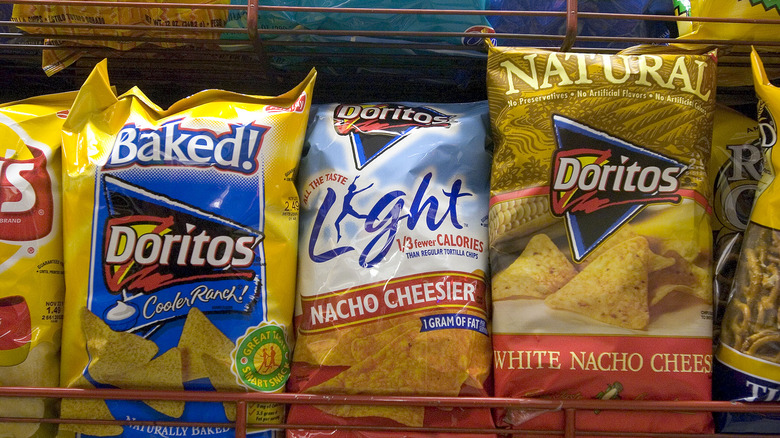The Surprising Reason Doritos Light Were Banned In Other Countries
Most people have a favorite type of junk food. If you're a fan of crunchy Doritos and the range of flavors that include nacho cheese, cool ranch, salsa verde, and more, you've probably wondered why they couldn't make a healthier version of your guilty pleasure. Yet, Doritos did launch a modified version called Doritos Light with fewer calories, per Obsev, which sounds like a Doritos lover's dream, right? This sounds like fabulous news. These days, any food item with "light" added to the name seems to suggest it's a healthier or better option, but that's not always the case.
The excitement of Doritos Light was short-lived, unfortunately, because it wasn't exactly as amazing as the marketing led us to believe. Additionally, there was an ingredient that was less than ideal, which has resulted in some countries outright banning any food product that contains it.
So you may be wondering why some countries would ban bags of Doritos that are supposedly a better choice.
This ingredient produced less than desired side effects
As it turns out, these modified flavored tortilla chips contain an ingredient that isn't good for people. The ingredient is known as olestra, which is a synthetic fat molecule that seemed to help junk food makers eliminate fat and reduce calories in products, according to Mental Floss. That may sound like a dream, but oftentimes when something sounds like it's too good to be true, it usually is.
The problem with olestra is it prevents nutrients from being absorbed, according to Obsev. That may not seem like a big deal, but when nutrients aren't absorbed well or properly, it can cause loose bowel movements as well as abdominal cramping, according to Obsev, which is exactly what happened. Basically, the synthetic fat was too big to be absorbed in the intestines, causing olestra to quickly pass through the digestive tract, according to Mental Floss.
Soon Frito-Lay, creators of Doritos and other products, received numerous customer complaints that these low calorie and low-fat chips were producing not so wonderful side effects, according to Mental Floss. In some European countries and Canada, olestra has been banned, which means any food products with it can't be sold.
If you stumble upon a bag of Doritos Light, you may want to question why these are still being sold and if they're worth possibly needing to rush to the bathroom after consuming these interesting chips.

